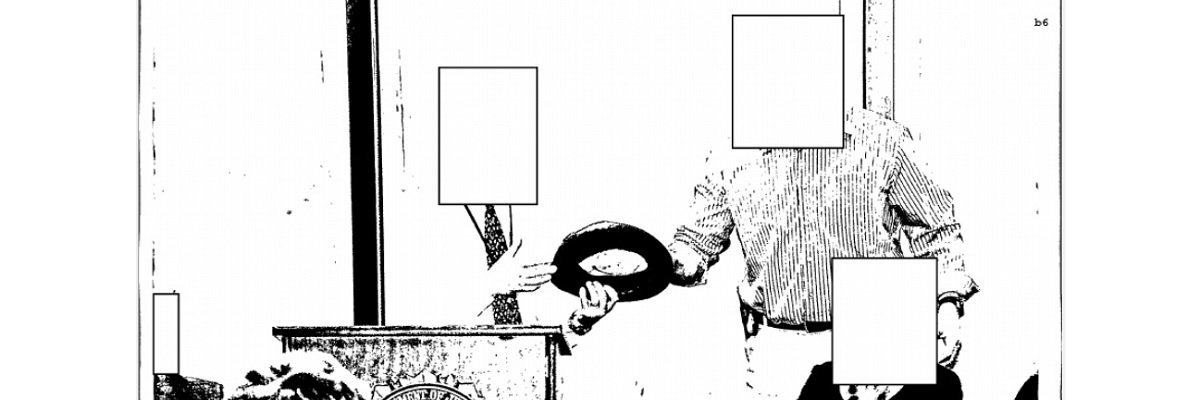If you only have a hammer, then every problem looks like a nail - and as we’ve learned over the years from many an overenthusiastic FOIA officer, if you only have a Sharpie, then every document looks classified. As part of our Sunshine Week coverage, we put together a list of the most ridiculous redactions we’ve (un)seen.
Amtrak’s Yes We Have No Snack Car
It took Amtrak a little over nine months to process Conor Skelding’s request for complaints regarding its lounge cars. While at first that may not seem like the kind of task that would require the same time it takes to fully gestate a human being, it appears that the FOIA officer took Conor’s request a bit … literally and redacted all complaints except those regarding the lounge car, giving you gems like this:
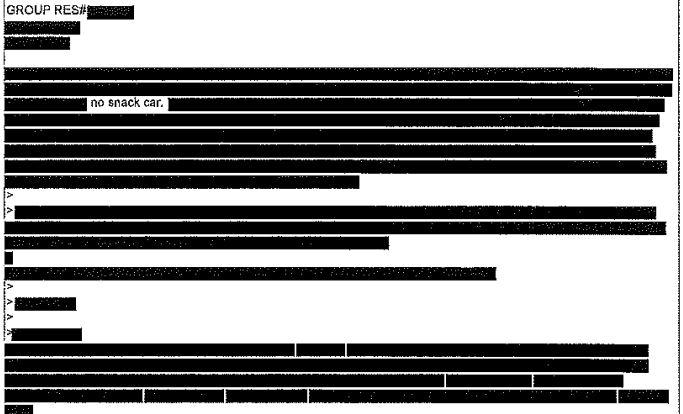
And this one, a horrifying short story in its own right.
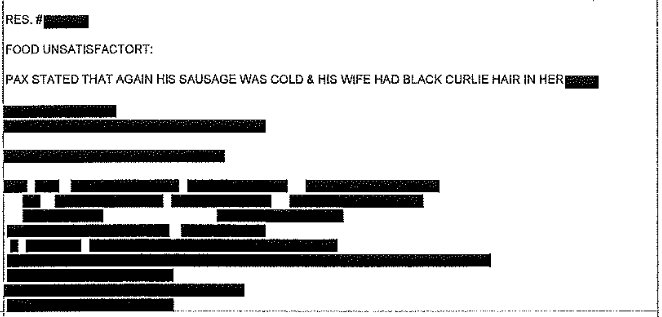
B(6), the Beyoncé Exemption
In 2013, there was controversy abounded when The Times of London alleged that Beyoncé’s perfect rendition of the “Star Spangled Banner” during Obama’s second inauguration was the work of lip-syncing. Unperturbed, MuckRock’s founder Michael Morisy seized on this as an opportunity to use FOIA to release those tracks, providing public-domain Bey for all. Sadly, his efforts were thwarted by a combination of FOIA not working that way, and of all things, John Williams. Yes, that John Williams.
Adding insult to injury (a phrase that will come up more than once in this article), Michael’s follow-up request for the processing notes on his request included a very notable omission.

Yes, despite it being a request about the very public performance of a very public figure, Beyoncé’s name was redacted, fittingly, under b(6), FOIA’s privacy exemption …

But what a strong, independent b(6) she is.
Bureau of Prisons’ Record Breaking Non-release
Also in 2013, the Justice Department’s Criminal Division was widely ridiculed for “releasing” 15 completely redacted pages to the ACLU.
Well, apparently there’s a inter-departmental competition on wasted ink, because earlier this year, fellow DOJ component the federal Bureau of Prisons responded to Beryl Lipton’s request for contracts with nearly 150 functionally blank pages … and to add insult to injury (see?), each page was rendered in an inexplicably hideous shade of bureaucratic yellow.
Adding additional insult to the already insulted injury, this was a physical release, so each of those pages had to be scanned in manually.
The CIA’s Redaction Game Goes Meta
While we wrote about this just last week, we’re only now grasping the implications - the CIA spent over a year on John Kirsch’s request regarding JFK assassination researcher Mary Ferrell, and their final response was just a copy of his original request, with the very dead Ferrell’s social security number scratched out.

Which means the CIA have achieved the impossible and managed to release less information through FOIA than we had to begin with. Begrudging respect, that’s taking “less is more” to the next level.
The DEA’s Pretty Sure You’re Okay with █████
Back in 2014, CJ Ciaramella received training slides from the DEA regarding the sinister-sounding, and ultimately, sinister-being practice of “parallel construction,” which encourages agents to hide evidence chains obtained from covert surveillance techniques, particularly the ethically ambiguous ones. To that end, the instructor differentiates between methods that Americans are chill with and ones that they are decidedly less chill with. Number one among chill-with methods is █████.

While the fact that this method is so acceptable you don’t even need to know its name might raise some eyebrows, this next slide should assuage all your lingering legal doubts.

See? Nothing to worry about.
Somehow, what was left in the slides manages to be even less comforting that what was taken out - including some not-at-all-inappropriate Dirty Harry trivia to make sure folks are paying attention.

The IRS’s Mission: Incredible Waste of Time and Money
Last year, Alex Richardson filed several requests to the IRS regarding their embattled Whistleblower’s Officer, which has been charitably described as “intentionally undermined.” Seeing as the agency had already gone far enough to break out the “neither confirm nor deny” denial on the subject, we didn’t get our hopes up … which is why we were caught off-guard when a CD of “responsive documents” arrived in the mail.
Even more enticingly, the CD was encrypted, with a note that further instructions would come in the mail. Cue strings.
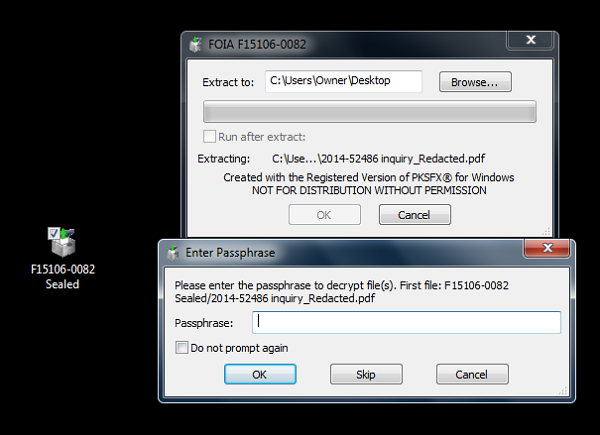
Sure enough, a day later those instructions came, and even though they were a tad on the underwhelming side (the passcode turned out to be “FOIAis” and the tracking number) we were eager to get our hands on the obviously valuable information contained therein, which turned out to be … six completely redacted pages.
At least one staff member self-destructed in 30 seconds.
Finally, to add iInsult to iInjury, the encryption program only works on Windows - so Apple users can’t even access the nothing they’ve got.
The NYPD’s Pigpen Exemption
Not all redactions are intentional - after Shawn Musgrave successfully fought the NYPD’s claim that he hadn’t “reasonably described” the very specific form he had requested by using the very specific form number, they relented and handed over a copy. Although, apparently, first they rubbed a diarrhetic squid over it …
and then they handed over a copy. Significantly more legible was the cover letter that came with the release, demanding a $1.25 for copying fees. Insult, injury, etcetera.
In a rare FOIA-ry Tale ending, Shawn pushed back on grounds that, well, he was kinda actually hoping to read the thing, and the NYPD coughed up a clean copy. As for our calimari friend, looks like they were adopted by the FCC.
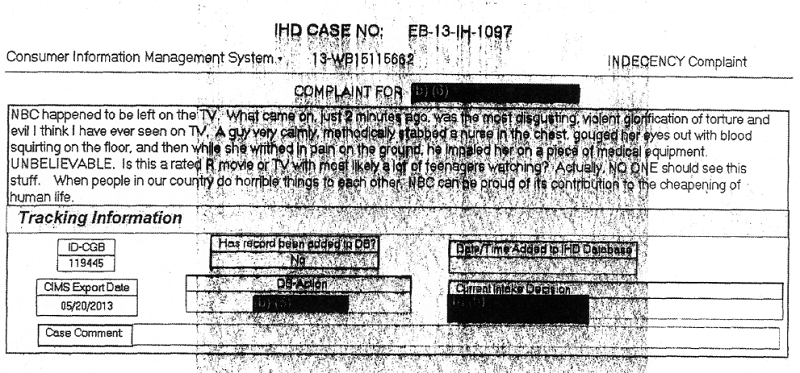
The Sobering, Staggering Conclusion
Five years ago, before everyone and their libertarian uncle were up in arms about bulk data collection, Jason Smathers requested talking points from the NSA. Nearly two years later, this request produced perhaps the pinnacle of the FOIA officer’s art form - “These are sobering findings.“

Often imitated …

But never duplicated, we keep the original copy above the MuckRock coffee machine as a daily reminder that sunlight isn’t just the best disinfectant …

but it’s a pretty decent check on self-importance, too.
Happy Sunshine Week, everybody!
Image via Brad Heath
